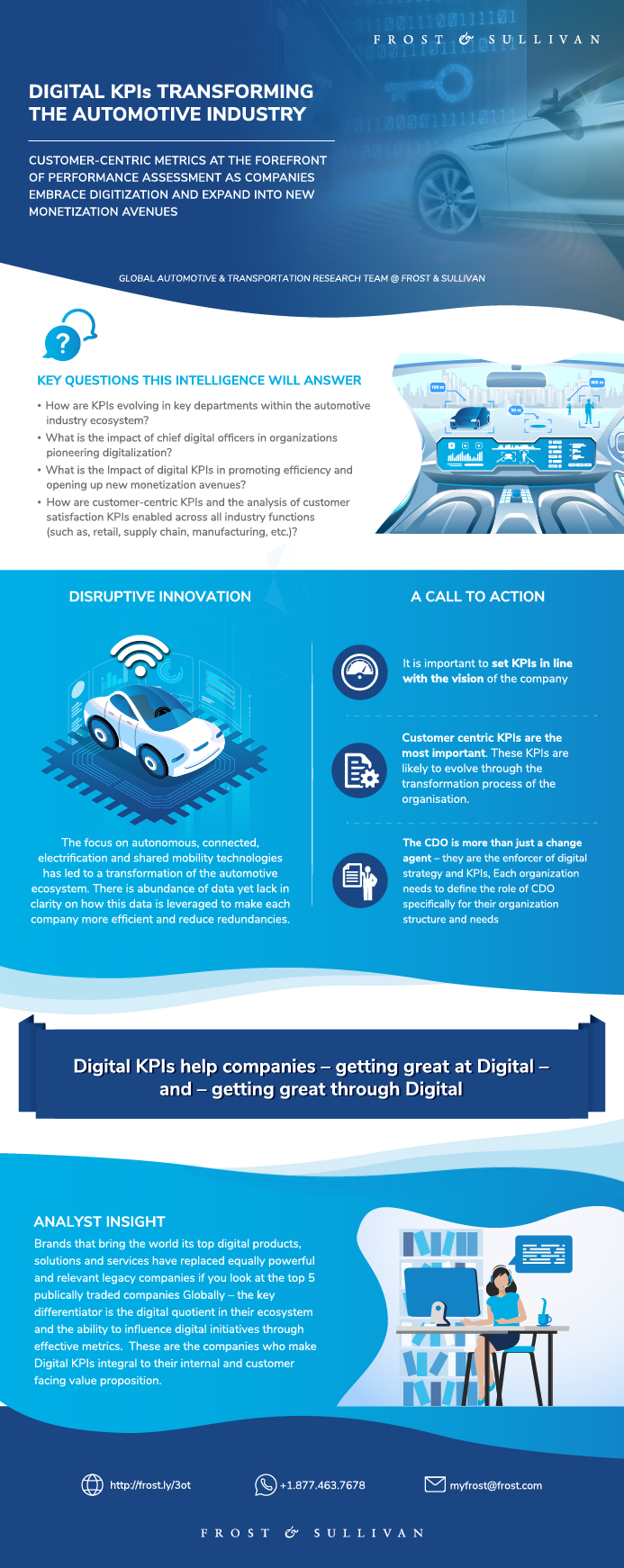Digital KPIs Transforming the Automotive Industry
Digital KPIs Transforming the Automotive Industry
Customer-centric Metrics at the Forefront of Performance Assessment as Companies Embrace Digitization and Expand into New Monetization Avenues
16-Jul-2019
North America
Description
The automotive industry as we now know it is undergoing a distinct, irreversible shift. Nothing is the same it was five years ago.
Companies continue investing in new technologies that will enhance their customer-facing applications and their internal efficiencies. However, when it comes to measuring their performance as an organization or to assess the functions that have been fed new digital data, they draw a blank.
Digital KPIs are the need of the hour. These new KPIs will help an organization determine if the digital investments will sustain and drive the company’s bottom line or if they are nothing more than a digital parlor trick.
Digital KPIs can be classified into two categories: product KPIs and process KPIs. Product KPIs serve to measure customer-facing products, such as a mobile app, a VR application, or a dealership itself. Product KPIs, on the other hand, serve as employee- and process-measuring parameters that help gauge the impact of digital assets. A series of S.M.A.R.T goals—goals that are Specific, Measurable, Attainable, Relevant, and Time Bound—can help determine if such an investment was a success or a failure.
The Mega KPI that no OEM ever tracks—nor could track for lack of access in the past—is the customer. This entity needs to be an automotive participant’s number one focus. Measuring the impact of a digital process on the customer is one of the most decisive metrics that will help evaluate the digital efforts of an organization.
Though digital KPIs measure the impact of digitization effort on both the customer and the company, they need to be further structured and quantified to be a part of the leadership team’s metrics.
Digital transformation is a key strategy; however, with the competition in the automotive landscape, the stakes are often high. By leveraging the experience of working with many leading organizations, Frost & Sullivan has built the expertise to be a knowledge partner that can help organizations across the automotive value chain in this transformational shift.
This research service seeks to answer the question, “So what KPIs should my organization be regularly monitoring on its dashboard?” It is designed to serve as a handy guide that will bring you up to speed on the new metrics that will help your organization review digitization in supply chain, manufacturing, connected products, retail, finance, electric charging ecosystem, and new mobility solutions. By evaluating the role of the Chief Digital Officer (CDO) in FMCG and industrial solutions industries, and even in governments, Frost & Sullivan has assessed the impact a CDO could have on the automotive industry and proposes next steps to making this a reality.
Measuring customer relationship or digital Initiatives may not be an easy task, but it is possible, and its manifold benefits can be realized within the first 18 months.
Author: Isaac Abraham
RESEARCH: INFOGRAPHIC
This infographic presents a brief overview of the research, and highlights the key topics discussed in it.Click image to view it in full size

Table of Contents
The Need for Digital KPIs
The Need for Digital KPIs—Transformative Change Agents
The Need for Digital KPIs—Key Drivers for Automotive Ecosystem
The Need for Digital KPIs—Digital Businesses Take the Lead
The Need for New KPIs in the Evolving Automotive Industry—Case Study: Daimler
Select Leading Organizations Which Have Created Senior Digital Roles
Selection of Digital KPI Examples and Benefits
Challenges in Embracing Digital KPIs
Research Scope
Key Questions
Digital KPIs
The Six Pillars of Digitalization in the Automotive Industry
Impact of Digitalization on Supply Chain Ecosystem
Digital Supply Chain KPIs
Impact of Digitalization on Manufacturing Ecosystem
Manufacturing and Plant Management KPIs
Impact of Digitalization on Connected Products Ecosystem
Connected Products KPIs
Impact of Digitalization on EV Infrastructure Ecosystem
EV Charging Ecosystem KPIs
Impact of Digitalization on Automotive Retail Ecosystem
Digital Retail KPI
Impact of Digitalization on Automotive Finance Ecosystem
Digital Auto Finance KPI
Impact of Digitalization on Aftermarket Garage Services
Digital Automotive Aftermarket KPIs
Impact of Digitalization on the Mobility-as-a-Service Ecosystem
Mobility as a Service KPI
Automotive Chief Digital Officer—Responsibilities
Select Leading Organizations Creating Senior Digital Roles
Select Leading Organizations Creating Senior Digital Roles (continued)
Chief Digital Officer—Evaluation KPIs
The Role of the CDO—Volvo Cars Case Study
Growth Opportunities in Building Digital KPIs
Strategic Imperatives for Success and Growth
3 Big Predictions
Legal Disclaimer
Market Engineering Methodology
Hot Topics Covered by F&S Retail Research Team
Our Retail Consulting Value Proposition
Popular Topics
| No Index | No |
|---|---|
| Podcast | No |
| Author | Isaac Abraham |
| Industries | Automotive |
| WIP Number | ME14-01-00-00-00 |
| Is Prebook | No |
| GPS Codes | 9673-A6,9800-A6,9807-A6,9813-A6,9B01-A6,9801-A6,9963-A6,9A70-A6,9882-A6,9965-A6,9AF6-A6,9B07-C1 |
 USD
USD GBP
GBP CNY
CNY EUR
EUR INR
INR JPY
JPY MYR
MYR ZAR
ZAR KRW
KRW THB
THB